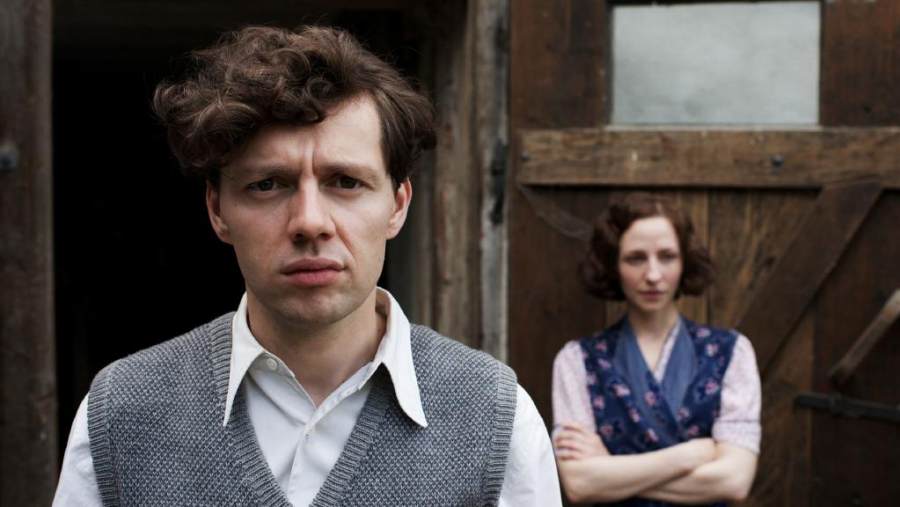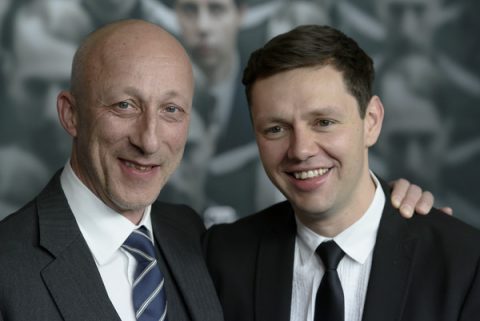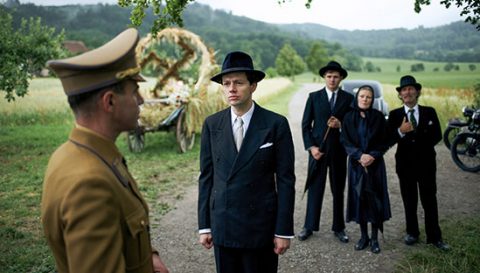

Oliver Hirschbiegel first gained international attention for his taut character study Downfall in which he examined the last ten days in Hitler's life with some accusing him of trying to humanize one of the most detestable figures that ever lived. In 13 Minutes he comes up with its antithesis, of sorts, as he depicts Georg Elser’s (Christian Friedel) failed attempt to assassinate the Fuhrer in 1939. As full of melancholy as Downfall, 13 Minutes shows how a regular man who wanted to put an end to evil found himself putting those he loved the most in danger. Anchored by Friedel’s intense performance, the film is as thrilling as it’s moving. We spoke to director Hirschbiegel about making another WWII movie, working with Friedel, and how his country has changed its position in the world.
You made the movie two years ago but it’s coming out in America at the right time in a sad way…
(Laughs)
….when you made it, did you imagine it would be so relevant?
No. Look at what’s happening right now, even in Saudi Arabia and Qatar, if you wrote that in a screenplay somebody would’ve slapped you because it sounds so unbelievable. It’s what’s happening in America, in England, look at France and how Macron rose from nowhere to become the new President. It seems these days the Germans are the only normal people (laughs), Germany continues doing things the way they used to which makes it boring, but everywhere else things are looking scary, very scary.
Films serve as a way to preserve memories and maybe help us not make the same mistakes over and over again. Is this in any part why you wanted to make movies?
I think my main intent was that I loved telling stories, I was an artist before being a director, and had worked with film on an experimental level. I realized I wanted to tell stories, I loved going to the movies and watching films, so that was the initial motive. Looking at my work now, people call me a political filmmaker, and even though I didn’t think of myself that way, it seems most of my films deal with social or sociopolitical issues. I’m a humanist, I believe in that basic Christian idea of friendship between people, curiosity and not waging war.
What about Georg Elser’s story made you think it would be a good movie?
I was always fascinated by him, he was like a riddle, people talked about him like someone who was mad, weird and an outsider. I got approached several times to make a film about him but I turned it down because I didn’t want to make another film about the Third Reich, but the last time they had changed the script slightly, with the idea of starting the film with Georg getting caught and then going back and seeing how Germany had been beautiful and peaceful, and then the Nazis creeped in. I thought that was the right way to make this.
The flashbacks are so gorgeous. Aesthetically how important was it for you to establish this contrast between the horrible present and this pastoral past?
Whenever I dealt with the Third Reich I wanted the scenes to feel suffocating, static and stone cold. Looking at the beautiful traditions of the Germans, the country and the way people were between the wars, were things I’d never seen depicted before. There used to be a whole genre of Heimat (homeland) movies, even the Nazis made them, they were about the mountains, the countryside, peaceful living. I wanted to use elements of that, not as cheesy as the Nazis did, but I wanted to use that as a contrast.
Were there events you had to leave out of the movie but wished you’d been able to include?
Not really, everything you see is based on accounts. In a story like that you can’t make things up, I took some liberties based on descriptions and photographs.

When we first meet Georg he’s looking gaunt and full of anger, in the flashbacks he’s full of life. How did you work with Christian Friedel to shape this journey?
He’s an exceptional actor, he’s like Bruno Ganz in a way. He becomes that character without needing a lot of makeup, he takes on the energy, basically I gave him three or four guidelines for his character, and I think he surprised himself with what he came up with. I was certainly surprised.
He reminded me so much of Peter Lorre.
You’re absolutely right.
Did you give him any homework, as in movies to watch?
I made all the actors watch German films of the time in order to get an idea of how people carried themselves, and how they spoke the language. That changes throughout time, in American films of the 40s you can hear how differently people spoke then. For Christian I told him his character wasn’t educated, but he’s intelligent, he was curious, a musician, the ladies liked him because of this, he was a cool guy. That’s what I got from the accounts and pictures, he was vain to a certain extent, but the core of this man is he’s a free spirit. It’s what makes him different from the other people.
In 13 Minutes and Downfall we see how the war destroys men on both sides of the conflict. Do you think these two films are in conversation with each other in any way?
You can’t compare Hitler to Elser, who was the total opposite of Hitler, but that connects them of course. You see very early on that he realizes that these people are a great danger to Germany, Europe and the rest of the world, they quickly establish a system that relies on violence to control people. Elser was a religious man, he was all about freedom, individuality, creativity, and those are all the things that system did not allow. So yes they’re connected.
Invasion is the only of your films which wasn’t based on real events, but I’m sure we could find political parallels in this too if we wanted, was making this film kind of like a break from the rest of your work?
No because the unfortunate thing about it is I had to start shooting before the screenplay was where I wanted it, my initial intention was to follow through the sociopolitical commentary of what was going on in the world, rather than suspense. But with a big studio picture there are other elements that take over. Right?
Do you feel a different kind of responsibility making films about real life people?
It make things easier, you have sources who can tell you how people were, but you also have the duty not to fool around with it, you need to stay true to the story and the characters. But I have to say I quite enjoy that.

Like you mentioned before Germany has become the moral center of the Western world, throughout history German films have been trying to answer questions about the Holocaust, but do you see German art take a turn as the country becomes a model nation?
Germany has become that, it’s astonishing to travel now. We dealt with our history, we’re still responsible for the greatest crime committed in the history of mankind, and yet as we’ve openly dealt with that guilt it seems that other nations and other people have seen us a country they can trust. I’ve heard people say “you’re German, you’re the good guys”, maybe we are? I don’t know about that. The American President has taken himself out of the race when it comes to influencing the world and before you know it the Germans will have a stronger position.
Have you been relying on art to keep sane in the craziness of our world?
I watch TV series, as everybody does these days, there’s not many interesting films out there, so I’m more into series. Different ones, Italian, English, lots of American ones, and they help me get out of what’s happening in the world. But television has become so smart and fast that in many series you see reflections of what’s actually happening right now. I also watch lots of old films, those are my bread and butter. I’m going through a Tarkovsky phase now, after 30 years I’ve been rewatching his movies, I recently saw The Mirror.
I love Tarkovsky, but I prefer to see more comedies lately.
(Laughs) Right. He’s so powerful, to me it’s always a kick in the ass to see the work of a brilliant man. It reminds me to be better at what I’m doing.
After Diana are you interested in exploring more romance films?
The next movie I’m doing is a piece about a dying woman, about a love that had a chance but the people involved made a mistake. There’s a romantic aspect there but it’s more classic drama. If the script and characters are right I’m drawn to those stories, but it’s hard to find them, they’re always so cheesy. That’s why I liked Diana, it was about a passionate, out there woman who fell in love with a Pakistani man. I found that so interesting, unfortunately the English didn’t want to see that, you know that (laughs). But it was a beautiful story and it fascinated me.
13 Minutes is in theaters tomorrow.